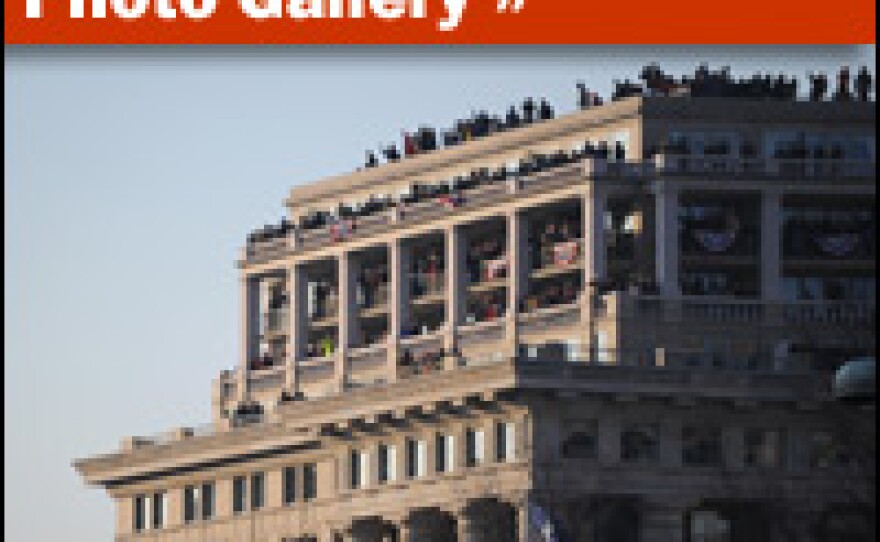
The inauguration of Barack Obama made good on predictions that it would be the largest public gathering Washington, D.C., had ever seen. But the sheer volume of people massed on the National Mall created slowdowns and kept away thousands of people who had tickets for the noontime ceremony.
As security and transportation authorities mobilized, with tens of thousands of police and military personnel patrolling the streets, security checkpoints were quickly clogged.
Meanwhile, authorities said they were checking out a "potential threat" of "uncertain credibility."
"The FBI, the Department of Homeland Security (including the Secret Service) and the intelligence community are coordinating with other law enforcement authorities to investigate and analyze recently received information about a potential threat on Inauguration Day," a statement from the Department of Homeland Security said. "The Transition Team has been briefed and is fully integrated into the process."
Metal walls and barricades were in place, controlling access to the Capitol and the inauguration parade route.
Earlier in the day, a cheerful, block-party atmosphere prevailed in much of the jampacked city. But the patience of many who were trying to take part in the festivities was sorely tested. Three-hour waits were reported at one entry point.
Outside one Capitol entrance, unused tickets began to litter the streets along with used-up hand warmers and shreds of newspapers.
Earlier Tuesday morning, a mob of people broke through the handicapped entrance, according to a U.S. Capitol policeman who declined to be named. He told a crowd of distressed ticketholders that the gates were being sealed.
A park policeman told people to find a bar where they could watch the ceremony on television.
Some of the people who were turned away spoke of having waited in line in a tunnel since 4 a.m. Some were in tears.
The crowd at the National Mall continued to swell as people came in from all corners of the city, stretching from the Capitol to the Lincoln Memorial. D.C.'s transit system reported that it had carried nearly 874,000 passengers as of 5 p.m.
But it was slow going at many points. On Pennsylvania Avenue, halfway between the Capitol and the White House, the parade route was lined with Marines and police officers. In some places the authorities stood shoulder to shoulder, keeping the crowd from pushing into the street.
At the entrance to the "Purple" section of the U.S. Capitol grounds, the scene turned chaotic at midmorning, with a large crowd backed up, waiting to enter. There was some pushing and shoving. Only 20 people at a time were being allowed to cross the parade route — and those who had expected to cross at one intersection were shuttled four blocks to make the transit.
At least one checkpoint was closed because of the sheer volume of traffic, forcing pedestrians to try to find another route to stake out a spot to watch the inaugural parade.
Mall visitors were urged to use public transportation — chiefly the D.C. Metrorail system — to reach Tuesday's events. But Metro reported that it had shut down one station close to the Mall for a time because a 68-year-old woman fell on the tracks. She was taken to the hospital, but authorities said her injuries were not life-threatening. The shutdown further complicated efforts to move around the city.
At another intersection, a large man in a yellow coat pushed his way against the crowd, swimming upstream.
"I'm going home," he said.
There were so many people at the corner that it was hard to breathe. There was no personal space.
And it remained cold, with a Red Cross tent at the Capitol overwhelmed by people who appeared to be suffering from hypothermia — so many that unless people were unconscious, they were turned away.
Despite the obstacles, the Mall crowds were mostly exhilarated, and the mood extended to the hawkers greeting them at every street corner with Obama hoodies, key chains, posters, flags and buttons –- even air fresheners.
Hours later, as tired, chilly throngs made their way from the inaugural ceremony and parade, some were frustrated by a lack of available transportation. William and Beverly Wright of Savannah, Ga., said they went to one subway station and found it closed. They walked to another and couldn't get in there either.
"Why are the metros closed? I just don't understand that," William Wright said. "With this amount of people in the city ..."
"There's no one here to help you," his wife cut in. "We're just walking around in circles."
Mixed in among the crowd were security officials of all kinds. The Secret Service was coordinating security for the inauguration. No fewer than 58 different government agencies were working the event. They also brought in backup, including police and soldiers from all over the country, all deputized to enforce Washington, D.C., laws.
The Transportation Security Administration deployed an untold number of what it calls VIPER teams, featuring specialists in terrorism prevention and response. They have been trained to work on trains, planes, at ports and aboard all modes of transportation.
"There will be security you that you can see and security that you can't see," says Malcolm Wiley, a special agent with the U.S. Secret Service.
"We want for this event to be secure, but at the same time we don't want for security to be the story," Wiley says. "The democratic process here is the story and the celebration is the story."
With NPR reporting from Andrea Seabrook, Neda Ulaby, Laura Sullivan, Elizabeth Shogren and Brian Naylor.
Copyright 2022 NPR. To see more, visit https://www.npr.org. 9(MDAzMjM2NDYzMDEyMzc1Njk5NjAxNzY3OQ001))






